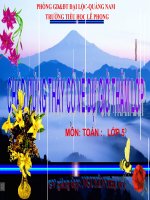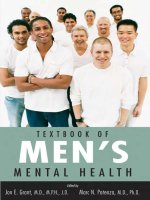Labels available on branded men’s readymade garments
Bạn đang xem bản rút gọn của tài liệu. Xem và tải ngay bản đầy đủ của tài liệu tại đây (526.41 KB, 10 trang )
Int.J.Curr.Microbiol.App.Sci (2020) 9(8): 2823-2832
International Journal of Current Microbiology and Applied Sciences
ISSN: 2319-7706 Volume 9 Number 8 (2020)
Journal homepage:
Original Research Article
/>
Labels Available on Branded Men’s Readymade Garments
Gayatri1*, Sakshi2, Savita Kumari3 and S. M. Landage4
1
Department of Textile and Apparel Designing, College of Community Science, DRPCAU,
Pusa-848125, Bihar, India
2
Department of Clothing & Textiles, GBPUA&T, Pantnagar -263145, Uttarakhand, India
3
ICDS Project, K V K, Hariharpur, Vaishali, DRPCAU, Pusa, Bihar, India
4
D. K. T. E. Society’s, Textile and Engineering Institute,
Ickalkaranji-416115, Maharashtra, India
*Corresponding author
ABSTRACT
Keywords
Label on garment,
Branded showroom,
Men’s readymade,
Brand for male
clothing
Article Info
Accepted:
22 July 2020
Available Online:
10 August 2020
Earlier fabric was made up entirely of one fiber type and people preferred to wear tailor
made garments. But due to industrialization, advancement in technologies various type of
fabric and readymade garments are available in market. Due to this, consumer need and
demand continuously change with the time and availability of the products. In regarding
this, the wearing style of people changed and now they prefer to wear readymade
garments. Nowadays, buying of fabric and selection of readymade garments and their care
are not as easy as in the days of our grandmother. In such situation and more in the
absence of labels, information about product is given by the seller which may not be
reliable. Thus, consumers are unable to judge the actual quality, cost and care of the
readymade garment. In this situation, labelling works as tool for assuring customer
regarding the quality, cost and care of readymade garments. Keeping in view these points
the study was conducted to collect information about labels which are presented on
readymade men’s wear. A self structure interview schedule was prepared. Fifteen owner of
branded showroom from Rudrapur, Uttarakhand were purposively selected as sample size.
Interview schedule consist two part i.e., general information and specific information.
Study showed that all readymade men’s wear categories i.e., casual, formal, winter, groom
and sport wear had labels pertaining information of size, brand labels, company name, bar
code and care. It was also found that maximum number of labels, presented in inside the
side seam and at centre back of the garment. Temporary label of tag type was present on
all the readymade garments.
Introduction
The apparel and textiles sector has been
equipped with better tool and techniques.
Therefore, change have been so numerous and
so rapid that every few years there are new
names for weaves, colour, finishes and the
new synthetic fabric and garment (Gayatri
and Sakshi, 2014)(1). So consumers are unable
to judge the quality and cost of garments
2823
Int.J.Curr.Microbiol.App.Sci (2020) 9(8): 2823-2832
available in the market for consumers. Beside
this, at present an intelligent consumer is not
satisfied with attractive appearance of the
material only. They look for other quality to
when they buy their cloths. They want to
know the nature of the fiber, if it is
serviceable, whether its colour is fast or fade
and if it will launder well, if it shrinks and so,
how much and most important of all, whether
it is worth the money spend on it. In such
situation labels provide information about
garment’s quality, guarantee about colour etc.
and also people now a day go and buy
garment directly from the showroom at
reasonable price because readymade garment
have advantages compare to tailor made
garments.
In India there is no textile labelling act exist at
present. But under Textile (Consumer
Protection) Regulation, 1988 there is mention
of labels for indigenously manufactured and
imported textiles, namely tops, yarn and cloth.
Federal Trade Commission (FTC) had
prepared guide to help to comply with federal
labelling requirements for textile, wool and
fur products (Gayatri and Sakshi, 2014)(2).
The law requires that most textile and wool
products have a label listing: the fiber content,
the country of origin, and the identity of the
manufacturer or another business responsible
for marketing or handling the item. It also
provide the information regarding mechanics
of labelling, label placement and attachment
for hosiery and other product sold in
packages.
Information provided on the label is usually
correct and regulated by law. So there was
need to check that which kind of label present
on readymade garments. So keeping in view
the present study was planned to collect
information related labels with the
objectives:- To collect information about
labels available on branded readymade men’s
wear.
Materials and Methods
The fifteen branded showrooms were selected
as sample for the present study, which were
involved in the sale of readymade men’s
wear. The data was collected by personal
interview method. A self structure interview
schedule was formulated with the help of
subject matter specialist.
Interview schedule had two parts. Part A of
interview schedule dealt with general
information of the branded showrooms which
included name of the showroom, year of
establishment, address, type of ownership,
type of retail format, financial aid to start
showroom. The part B of the schedule
consisted of questions related to types and the
position of labels present on different
garments such as informative labels, care
labels, placements of labels, and type of
attachment of the labels to the garment. The
garments were selected for checking labels
had to fulfill the following criteria; it should
have maximum number labels compared to
other garments of same category. The
statistical measures used for the analysis were
frequency and percentage.
Results and Discussion
General information of showroom owner
Table 1 gives information about distribution
of branded showroom according to type of
ownership, type of retail format and source of
financial aid to start the showroom. It is
evident from the Table that maximum i.e.,
73.33 per cent of the showroom owners were
sole proprietors and rest (26.67%) had
partnership. Sixty per cent of the showrooms
had franchisee type of retail format.
Maximum showroom owners started their
showroom by investing their own money.
Only twenty per cent of the showroom owners
took loan for starting the showrooms.
2824
Int.J.Curr.Microbiol.App.Sci (2020) 9(8): 2823-2832
Table 2 gives information regarding sale
assortment of different branded showrooms. It
is clear from table that casual shirts, jeans and
t- shirts were produced and sold by maximum
number of showrooms. It can be inferred from
table that only two showrooms sold sport
wear and wedding suits. It is evident from
table that maximum branded sold all formal
and winter wear except coat in winter wear.
Labels on casual wear
Table 3 gives data pertaining to labels present
on branded men’s casual wears which
included shirts, jeans, bermuda shorts and tshirts.
all the bermuda shorts of the branded
showroom.
T – Shirt
Labels pertaining to size, brand name,
company name, bar code, care labelling
regarding washing, ironing and drying were
seen in all the t- shirt irrespective of brand.
All the t-shirts had labels which were placed
at inside side seam.
Labels on men’s formal wear
All the shirts had labels pertaining to size,
brand name, company name, bar code, care
labeling regarding washing, ironing. Labels
were placed inside the side seam, temporary
labels of tag type and permanent labels of
loop type were present on all the shirts.
Table 4 gives information regarding labels
present in branded men’s formal wear, which
included trousers, blazers, suits and shirts. It
is clear from the Table that irrespective of all
types of formal wear, labels pertaining to size,
brand name, company name, bar code and
also for care labels were present on all the
garments irrespective of their showrooms.
Temporary type of tag labels were attached on
all the men’s formal wear irrespective of their
age group category.
Jeans
Labels on men’s winter clothing
All type of jeans irrespective of brand had
labels related to size, brand name, company
name, bar code and care label including
washing, bleaching, ironing and drying.
Maximum (83.33%) labels were placed at top
centre back of the jeans that at waistline. Tag
type temporary labels were attached in all the
jeans while square and rectangular stitch
types of labels were found in jeans in
maximum showrooms.
Table 5 gives information related to labels
present on branded men’s winter clothing,
which include namely; Sweater both full and
half, coat, waistcoat, cardigan, sweatshirts,
blazers and jacket.
Shirts
Bermuda shorts
All the showroom selling bermuda shorts had
labels pertaining to size, brand name,
company name, bar code and care labelling
regarding washing and ironing irrespective of
their brand. Tag type of labels was attached in
Full sweater
Labels related to size, brand name, company
name, bar code were seen in all the full
sweaters irrespective of brand. Tag type
temporary label was presented on all the full
sweaters.
Half sweater
In case of half sweater size, brand name,
company name, bar code were presented on
2825
Int.J.Curr.Microbiol.App.Sci (2020) 9(8): 2823-2832
all the half sweaters. Care labels pertaining to
washing, bleaching, ironing and drying were
present on maximum half sweaters i. e., 90 %.
Tags, were the types of labels temporary
attached to all the half sweaters.
label related to washing, bleaching, ironing
and drying were seen on maximum cardigans
irrespective of brand i. e., 83.33 %.
Coat
All the sweatshirt had labels related to fiber
content, size, brand name, company name, bar
code and care regarding washing, bleaching,
ironing and drying.
All the branded coats had labels related to
country of origin, size, brand name, company
name, bar code, care labelling regarding drycleaning and temporary labels of tag type.
Waistcoat
All the waistcoats had labels related to size,
brand name, company name, bar code and
care labels regarding washing, bleaching and
ironing irrespective of brand.
Sweatshirts
Blazers
In case of blazers, labels pertaining to size,
brand name, company name, bar code and
care labels regarding dry-cleaning and
temporary labels of tag type were seen on all
the blazers irrespective of brand.
Jackets
Cardigan
Labels pertaining to size, brand name,
company name, bar code were presented on
all the cardigan irrespective of brand. Care
All the branded jackets had labels pertaining
to size, brand name, company name, bar code
and temporary labels of tag type.
Table.1 Distribution of branded showrooms according to general information
n=15
S. No.
Variables
Frequency
Per cent
Type of ownership
1
A
Sole proprietorship/ family business
11
73.33
B
Partnership
04
26.67
33.33
Type of Retail format
2
A
Specialty store
05
B
Departmental store
-
C
Franchisee
09
60.00
D
Exclusive
01
6.67
-
Source of financial aid
3
A
Loan
03
20.00
B
Self
12
80.00
2826
Int.J.Curr.Microbiol.App.Sci (2020) 9(8): 2823-2832
Table.2 Distribution of branded showrooms according to men’ readymade garments present in
their sale assortment
S.No.
1.
A
B
C
D
2.
A
B
C
D
3.
A
B
C
D
E
F
G
4.
A
B
5.
6.
a.
b.
Name of Garment Name of Brand
Men's Casual Clothing
Shirts
Reebok Store, Pepe Jeans, Black Berrys, The Raymond, Charlie Outlow,
Levi’s, Lee, Allen Solly, Vivacity, Cantabil, Spykar, Liverpool, Koutons.
Jeans
Reebok store, Pepe Jeans, The Raymond, Charlie Outlow, Levi’s, Lee, Allen
Solly, Vivacity, Cantabil, Spykar, Liverpool, Koutons.
Bermuda shorts
Reebok store, Pepe Jeans, Charlie Outlow, Levi’s, Lee, Cantabil, Spykar,
Liverpool, Koutons, Adidas.
T-Shirt
Reebok Store, Pepe Jeans, Charlie Outlow, Levi’s, Lee, Allen Solly, Vivacity,
Adidas, Cantabil, Spykar, Liverpool, Koutons.
Men's Formal Wear
Trousers
Pepe Jeans, Black Berrys, The Raymond, Charlie outlow, Swayamvar, Lee,
Allen Solly, Vivacity, Cantabil, Koutons.
Blazers
Black Berrys, The Raymond, Charlie outlow, Swayamvar, Allen Solly,
Vivacity, Cantabil, Koutons.
Suits
Black berrys, The Raymond, Swayamvar, Allen Solly, Cantabil, Koutons.
Shirts
Black Berrys, The Raymond, Levi’s, Swayamvar, Lee, Allen Solly, Vivacity,
Cantabil, Koutons.
Men's Winter Clothing
Full
Reebok store, Pepe Jeans, The Raymond, Charlie Outlow, Levi’s, Lee,
Vivacity, Adidas, Cantabil, Spykar, Koutons.
Sweater
Half
Reebok Store, Pepe Jeans, The Raymond, Charlie outlow, Levi’s, Lee, Adidas,
Cantabil, Spykar, Koutons.
Coat
Levi’s, Koutons.
Waistcoat
Pepe jeans, Charlie outlow, Koutons
Cardigans
The Raymond, Charlie outlow, Vivacity, Adidas, Spykar, Koutons.
Sweat shirts
Reebok Store, Pepe Jeans, Levi’s, Lee, Vivacity, Cantabil, Catabil, Spykar,
Koutons.
Blazers
Reebok Store, The Raymond, Allen solly, Cantabil, Spykar, Liverpool,
Koutons.
Jacket
Reebok Store, The Raymond, Charlie Outlow, Levi’s, Lee, Allen solly, Adidas,
Cantabil, Spykar, Liverpool, Koutons.
Groom Wear
Wedding Suit
Black Berrys, Swayamvar.
Sherwani
Swayamvar
Men's Nightwear None of the branded showroom sold Men’s night wears.
Men's Sportswear
Tracksuit
Reebok and Adidas.
Jogging Shorts
Reebok and Adidas.
2827
Int.J.Curr.Microbiol.App.Sci (2020) 9(8): 2823-2832
Table.3 Distribution of branded showroom for men’s casual wears according to label
information present on them
10
Care
Labelling
Permanent labels Temporary
labels
Stitch
(woven)
9
Fiber content
Country of origin
Size
Brand name
Company name
Certification labels
Bar code
Washing
Bleaching
Ironing
Dry cleaning
Drying
Collar band
Top center back of
the garment
Side
Inside
seam
Outside
On wrapper/package
Tag
Removable ticket
Pamphlet
Placement of
label
1
2
3
4
5
6
7
8
Attributes
Type of attachment
S.
No.
Printed
Loop
Square
Rectangular
Mitered
Embroidered
Where: F= Frequency, % = Per cent
Shirts
N=13
F
%
04
30
06
46.15
13
100
13
100
13
100
02
15.38
13
100
13
100
12
92.31
13
100
0
0
12
92.31
2
15.38
11
84.62
Jeans
N=12
F
%
06
50.00
04
33.33
12
100
12
100
12
100
0
0
12
100
12
100
12
100
12
100
0
0
12
100
0
0
10
83.33
Bermuda
shorts N=10
F
%
01
10.00
04
40.00
10
100
10
100
10
100
0
0
10
100
10
100
9
90.00
10
100
0
0
9
90.00
0
0
9
90.00
T- Shirt
N=12
F
%
04
33.33
07
58.33
12
100
12
100
12
100
01
8.33
12
100
12
100
11
91.67
12
100
0
0
12
100
0
0
11
91.67
13
0
0
13
0
02
100
0
0
100
0
15.38
0
0
0
12
0
01
0
0
0
100
0
8.33
0
02
0
10
0
01
0
20.00
0
100
0
10.00
12
02
O
12
0
0
100
16.67
0
100
0
0
04
13
05
07
01
30.77
100
38.46
53.85
7.69
0
05
06
06
0
0
41.67
50.00
50.00
0
02
04
01
09
01
20.00
40.00
10.00
90.00
10.00
04
11
0
06
00
33.33
91.67
0
50.00
25.00
03
23.08
03
25.00
03
30.00
02
16.67
N= Total number of showrooms
2828
Int.J.Curr.Microbiol.App.Sci (2020) 9(8): 2823-2832
Table.4 Distribution of branded showroom for men’s formal wears according to label
information present on them
S.
No.
Care
Labelling
Removable ticket
Pamphlet
Printed
Loop
Square
Rectangular
Mitered
Embroidered
Stitch
(woven)
Temporary
labels
Permanent
labels
10
Placemen
t of label
9
Fiber content
Country of origin
Size
Brand name
Company name
Certification labels
Bar code
Washing
Bleaching
Ironing
Dry cleaning
Drying
Collar band
Top center back of the garment
Side
Inside
seam Outside
On wrapper/package
Tag
Type of attachment
1
2
3
4
5
6
7
8
Attributes
*Where: F= Frequency, % = Per cent
Trousers
N=8
F
%
01
12.5
02
25.00
08
100
08
100
08
100
0
0
08
100
07
87.50
07
87.50
08
100
0
0
08
100
0
0
03
37.5
0
0
0
0
01
12.5
08
100
Blazers
N=10
F
%
05 50.00
01 10.00
10 100
10 100
10 100
0
0
10 100
0
0
0
0
0
0
10 100
0
0
0
0
04 40.00
0
0
0
0
0
0
10 100
Suits
N=6
F
%
02 33.33
0
0
06 100
06 100
06 100
0
0
06 100
0
0
0
0
0
0
06 100
0
0
0
0
01 16.67
0
0
0
0
0
0
06 100
F
03
05
09
09
09
01
09
07
07
07
02
07
0
04
09
0
0
09
Shirts
N=9
%
33.33
55.56
100
100
100
11.11
100
77.78
77.78
77.78
22.22
77.78
0
44.44
100
0
0
100
0
0
01
02
04
04
0
01
0
01
04
04
07
07
0
01
0
0
0
01
03
05
0
0
0
0
02
06
02
07
02
0
0
0
22.22
66.67
22.22
77.78
22.22
0
0
0
12.5
25
50
50
0
12.5
*N=Total number of showrooms
2829
0
10.00
40.00
40.00
70.00
70.00
0
10.00
0
0
0
16.67
50
83.33
0
0
Int.J.Curr.Microbiol.App.Sci (2020) 9(8): 2823-2832
Table.5 Distribution of branded showroom for men’s winter wears according to label
information present on them
S.
No
.
10
Care labeling
Placement
of label
9
Fiber content
Country of origin
Size
Brand name
Company name
Certification labels
Bar code
Washing
Bleaching
Ironing
Dry cleaning
Drying
Warning (twist)
Collar band
Top center back
Of the garment
Side Inside
seam Outside
On
wrapper/package
Tag
Removable ticket
Pamphlet
Printed
Loop
Square
Rectangular
Mitered
Embroidered
Type of attachment
Permanent
Temporary
labels
labels
Stitch
(woven)
1
2
3
4
5
6
7
8
Attributes
Sweater
Full
Half
N=11
N=10
F
% F %
9 81.82 9 90.00
4 36.36 4 40.0
11 100 10 100
11 100 10 100
11 100 10 100
0
0
0
0
11 100 10 100
10 90.91 9 90.00
10 90.91 9 90.0
10 90.91 9 90.0
1 9.09 1 10.00
10 90.91 9 90.00
4 36.36 4 40.0
0
0
0
0
6 54.54 5 50.00
Coat
N=2
F
0
2
2
2
2
0
0
0
0
0
2
0
0
0
0
10 90.91 8 80.00 0
0
0
2 20.00 0
0
0
0
0
0
11
0
0
4
7
2
4
3
3
*Where: F= Frequency, % = Per cent
100
0
0
36.36
63.63
18.18
36.36
27.27
27.27
10
0
0
2
6
2
3
2
4
100
0
0
20.00
60.00
20.00
30.00
20.00
40.00
2
0
0
1
1
2
2
0
0
%
0
100
100
100
100
0
0
0
0
0
100
0
0
0
0
0
0
0
100
0
0
50.00
50.00
100
100
0
0
Waist
coat
N=3
F %
1 33.33
0 0
3 100
3 100
3 100
0 0
3 100
3 100
3 100
3 100
1 33.33
2 66.67
1 33.33
0 0
0 0
Card
i-gan
N=6
F %
5 83.33
2 33.33
6 100
6 100
6 100
0 0
6 100
5 83.33
5 83.33
5 83.33
1 16.67
5 83.33
1 16.67
0 0
4 66.67
Blazer
N=7
Jacket
N=11
F %
5 71.43
2 28.57
7 100
7 100
7 100
0 0
7 100
0 0
0 0
0 0
7 100
0 0
0 0
0 0
2 28.57
F %
5 45.45
4 36.36
11 100
11 100
11 100
1 9.09
11 100
2 18.18
1 9.09
1 9.09
10 90.91
1 9.09
0
0
0
0
5 45.45
1 33.33 6 83.33 5 55.55 0
0 0 0 0 0 0 0
0 0 0 0 0 0 0
3
0
1
1
1
1
0
0
1
100
0
33.33
33.33
33.33
33.33
0
0
33.33
6
0
0
1
6
0
0
3
1
*N=Total number of showrooms
2830
Sweat
shirts
N=9
F %
9 100
2 22.22
9 100
9 100
9 100
0 0
9 100
9 100
9 100
9 100
1 11.11
9 100
1 11.11
0 0
5 55.55
100
0
0
16.67
100
0
0
50.00
16.67
9
0
0
3
7
1
2
1
1
100
0
0
33.33
77.77
11.11
22.22
11.11
11.11
7
0
1
1
2
3
4
0
0
0
0
0
100
0
14.28
14.28
28.57
42.86
57.14
0
0
5 45.45
2 18.18
0
0
11
0
0
4
9
7
4
0
1
100
0
0
36.36
81.82
63.63
36.36
0
9.09
Int.J.Curr.Microbiol.App.Sci (2020) 9(8): 2823-2832
Table.6 Distribution of branded showroom for men’s groom and sport wears according to label
information present on them
S.
No.
Side
seam
Stitch
(woven)
Temporary
labels
Type of attachment
10
permanent
labels
9
Fiber content
Country of origin
Size
Brand name
Company name
Certification labels
Bar code
Washing
Bleaching
Ironing
Dry cleaning
Drying
Collar band
Top center back
of the garment
Inside
Outside
On wrapper/
package
tag
Removable ticket
Pamphlet
Printed
Loop
Square
Rectangular
Mitred
Embroidered
Placement of Care labelling
label
1
2
3
4
5
6
7
8
Wedding
suit N=2
F
%
0
0
0
0
02
100
02
100
02
100
0
0
02
100
0
0
0
0
0
0
02
100
0
0
0
0
0
0
Attributes
*Where: F= Frequency, % = Per cent
Sherwani
N=1
F
%
01 100
0
0
01 100
01 100
01 100
0
0
01 100
0
0
0
0
0
0
01 100
0
0
0
0
01 100
Track suits
N=2
F
%
01
50.00
01
50.00
02
100
02
100
02
100
0
0
02
100
02
100
01
50.00
02
100
0
0
02
100
0
0
02
100
Jogging
shorts N=2
F
%
01
50.00
01
50.00
02
100
02
100
02
100
0
0
02 100
02
100
0
0
02
100
0
0
02
100
0
0
02
100
0
0
0
0
0
0
0
0
0
0
0
0
02
0
0
100
0
0
02
0
0
100
0
0
02
0
0
0
0
02
02
0
0
100
0
0
0
0
100
100
0
0
01
0
0
0
01
0
01
0
0
100
0
0
0
100
0
100
0
0
02
0
0
01
01
0
0
0
01
100
0
0
50.00
50.00
0
0
0
50.00
02
0
0
01
02
0
0
0
0
100
0
0
50.00
100
0
0
0
0
*N=Total number of showrooms
Labels on men’s groom and sport wear
Table 6 gives data pertaining to labels present
on branded men’s groom wear i.e., wedding
suit, sherwani and men’s sport wear i. e., Track
suits and Jogging shorts.
Wedding suits
All branded wedding suits had labels related to
size, brand name, company name, bar code and
also care labels which related to dry-cleaning.
Tag was temporary label attached to all
wedding suits.
Sherwani
Sherwani sold by Swayamvar had labels related
to fiber content, size, brand name, company
name, bar code and care label regarding dry-
2831
Int.J.Curr.Microbiol.App.Sci (2020) 9(8): 2823-2832
cleaning. Tags were temporary labels attached
to sherwani.
Track suits
All track suit had labels related to size, brand
name, company name, bar code and care label
regarding washing, ironing and drying. Labels
were placed at top centre back and inside side
seam of the track suits. All track suits had
temporary tag type labels.
Jogging shorts
All the jogging shorts had labels related to size,
brand name, company name, bar code and care
label regarding washing, ironing and drying.
Tag was temporary type label attached to all
jogging shorts. Loop type permanent label
attached inside of side seam of all jogging
shorts.
Labels on men’s night wear
None of branded showrooms sold night wear in
their sale assortment. Night wear includes
pajamas and night suits.
In conclusion, the study show that casual shirts,
jeans and T- shirt sold by maximum number of
showroom. And also found the maximum
showrooms sold all formal and winter wear
except coat in winter which was sold by only
two showrooms. General information showed
that maximum i.e., 73.33 per cent branded
showroom owners were sole proprietors. Sixty
per cent of the showrooms were had franchisee
type of retail outlets, maximum started their
showroom by investing their own money.
Some other significant findings of the study
were that all readymade men’s wear categories
i.e., casual, formal, winter, groom, night and
sport wear had labels depicting information of
size, brand name, company name, bar code and
care including washing, ironing, drying and dry
cleaning. Maximum numbers of labels were
found in inside the side seam and at centre back
of the garment i.e., neck in upper garments and
waist in lower garments. Temporary labels of
tag type were present on all the readymade
garment. Information regarding fibre content
and country of origin were not present in
maximum no. of garment which were
mandatory as FTC regulation.
References
Gayatri and Sakshi. A Comparative study:
labels on readymade garments with
standards. The Journal of Rural and
Agricultural Research. 2014; 14 (2): 9396.
Gayatri and Sakshi. Knowledge assessment of
consumers on readymade garments.
Progressive Research: An International
Journal. 2014; 09 (2): 272-275.
Gayatri and Sakshi. Wardrobe of male teaching
professionals. The Journal of Rural and
Agricultural Research. 2014; 14 (2): 7881.
Gayatri, Sakshi and Virk, B. Consumer
awareness regarding label present on
ready-made garments. The Journal of
Rural and Agricultural Research. 2015;
15 (1): 65-67.
Gill, P., Grewal, N. and Lata, P. Trends in
textile labeling. Textile Trends. 2005; 48
(1): 41-46.
/>html.
Retrieved on September, 3, 2010.
How to cite this article:
Gayatri, Sakshi, Savita Kumari and Landage, S. M. 2020. Labels Available on Branded Men’s
Readymade Garments. Int.J.Curr.Microbiol.App.Sci. 9(08): 2823-2832.
doi: />
2832









